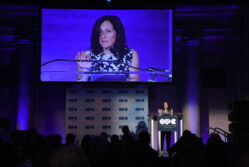Archive Event Highlight

OPC Awards Dinner Honors Courageous Reporting, Including Coverage of Wars in Gaza and Ukraine
by Kaela Malig
International correspondents and their colleagues gathered for the Overseas Press Club of America’s 85th Annual Awards Dinner at Cipriani 25 Broadway on April 25 to honor courageous reporting that shed light on the realities of conflict, resistance and resilience from around the world, in particular the wars in Gaza, Ukraine and Sudan. Also honored in the roll call of 22 awards was coverage of the looming threat of climate change, drug trafficking in Mexico and China’s brutal commercial fishing fleet.
In her keynote remarks, Maria Ressa, the 2021 Nobel Peace Prize winner and CEO of the Philippine digital media company Rappler, underscored the crucial role journalists play in fighting “information warfare” of authoritarian leaders, who exploit social media and other technologies to manipulate facts and “fuel our blackest emotions.”
“The challenge today is whether our international rules-based order still works. Too many are getting away with impunity, from countries to companies, and it’s dividing us in ways that are literally destroying us, destroying trust,” Ressa said. “As journalists, we are on the frontlines. And when we fail to hold the line, the people we serve lose their rights, their freedoms, their lives. So you – we – are jailed. We’re killed. Silenced.”
A candle-lighting ceremony highlighted an exceptionally high number of journalists who were killed while reporting over the last year, with the Israel-Hamas war among the deadliest conflicts for journalists in the past 30 years. The Press Freedom Candle, honoring journalists killed, imprisoned or harassed while doing their jobs, was lighted this year by Ayman Mohyeldin, host of MSNBC’s “Ayman.”
“For more than 200 days, the world has watched the unprecedented killing of Palestinian journalists. It has been an extremely difficult time watching them do their heroic work,” Mohyeldin said. “We’ve seen the killing of Israeli, journalists Lebanese journalists. We’ve seen governments both in Israel and Egypt deny access to journalists from around the world to go do what they do best – to report and show the world and cover what is happening.”
OPC President Scott Kraft presented the President’s Award to David Remnick, editor of The New Yorker, noting his three-decade contribution to international journalism as reporter and editor. A Pulitzer Prize winner for nonfiction and a George Polk Award winner for excellence in journalism, Remnick has written extensively for The New Yorker, including reports from the former Soviet Union and the Middle East.
“Reporters understand their mission – or the best of them absolutely do. The duty of editors is not only to support those reporters materially, spiritually and more, it is our duty, to the best of our ability, to ignore what is so politely called ‘the metrics.’ To meet seeming indifference to the affairs of our world beyond our borders with an ever more powerful commitment to publishing and airing foreign news with depth, imagination, and a sense that it matters,” Remnick said.
The New York Times and Reuters led the awards with four wins each, while The New Yorker earned a total of three awards and The Associated Press received two. Six awards recognized coverage of the Israel-Hamas war.
The Edward R. Murrow Award for best TV, video, or documentary interpretation of international affairs with a run time of up to 30 minutes was given to a team from Al Jazeera English for Witness–Rescue Mission Gaza, a film following an ambulance driver as he worked in Gaza.
One of the filmmakers was later killed in an Israeli strike and another was seriously injured. Mohammed Sawwaf, who was injured twice and lost his father, mother, four brothers, nephews and many other relatives during the war, sent video remarks on behalf of his team.
“It’s such good news to hear that this film is being honored amid the mounting grief that’s fallen upon us and the death that hangs over us and follows us everywhere in the Gaza Strip, specifically in the northern Gaza Strip,” he said. “We do not consider any work we do to be worthwhile or worthy of an award if it is unable to contribute to stopping the injustice being committed against the people here in the Gaza Strip – or anywhere in the world.”
The New Yorker’s Mosab Abu Toha won the Flora Lewis Award for best commentary in any medium on international news for essays he wrote capturing grim reality in Gaza. In a video played at the dinner, Abu Toha recounted an Israeli bombing that hit his family home, the deaths of family members, as well as the beating and interrogation he went through after he was accused of being a Hamas terrorist.
New York Times photographer Samar Abu Elouf received the Robert Capa Gold Medal Award for best photographic reporting from abroad requiring exceptional courage and enterprise for her reporting on devastation in Gaza even after she was separated from her own children. Sharing her struggles reporting on the ground, from lack of internet access to food shortages, Abu Elouf said in a video, “one of the biggest challenges for me covering this war was the killing of journalists. The conditions on the ground made it very difficult to work and the food and fuel shortages and being displaced from my home. I had to sleep in the front of my car for 60 days.”
Two of the three photography awards were for coverage of violence in Gaza. Mohammad Salem of Reuters received the Olivier Rebbot Award for best photographic news reporting from abroad in any medium, with judges calling his images “empathetic and poetic documentation of unimaginable loss, grief and terror.”
The David Kaplan Award for best TV or video spot news reporting from abroad went to CNN Worldwide for its coverage of the Israel-Hamas war. Giving a speech recorded from Israel on behalf of the team, Nic Robertson, international diplomatic editor for CNN, noted that Israelis are still in trauma after the Oct. 7 attack. “They still don’t know which way this war is going. They still don’t know where their safety is coming from,” he said. “You can’t talk about covering the conflict here, without thinking of the dozens upon dozens of journalists inside of Gaza who lost their lives. Their names are not household names, but their video is. It is through them that we are understanding what’s happening there.”
Many journalists also called for the release of Evan Gershkovich, an American reporter for The Wall Street Journal arrested by Russia on espionage charges. He marked his first year in Russian detention in March.
The newly renamed William Worthy Award, previously known as the Bob Considine Award, for best newspaper, news service or digital interpretation of international affairs was given to The New York Times for brave on-the-ground reporting on the war in Ukraine.
Valerie Hopkins said that “reporting in Russia for an American newspaper has become much more complicated since February 2022. Finding a way to scratch beneath the surface, without putting interlocutors or ourselves at risk requires careful planning but we believe that it is vital to tell the story of what’s happening on the ground.” Hopkins, an OPC member, received the OPC Foundation’s 2013 Jerry Flint Internship for International Business.
The Associated Press and PBS FRONTLINE’s 20 Days in Mariupol was also awarded for their work in documenting the early days of Russia’s invasion of Ukraine with harrowing footage from inside Mariupol.
Awarded the Peter Jennings Award for best TV, video, or documentary about international affairs, Mstyslav Chernov, on behalf of the team, said “it’s a difficult time, a time when Ukraine keeps getting bombed. A time when the story of Mariupol is not a story of Mariupol anymore. It’s a story of every city that got destroyed by Russian bombs.”
The first-ever Continuing Coverage of Conflict Award, which names the best reporting on a continuing international conflict in any medium, was given to a team from Reuters for a series that shed light on the underreported story of Sudan’s civil war, covering the systematic massacre and ethnic slaughter against the Masalit people.
Representing the team, Maggie Michael thanked her editors and said, “I would like to take this opportunity to remind you of Sudan’s forgotten war, especially as famine is knocking at the door. This war has left 9 million in displacements. Without media attention, there will be no international pressure to stop the fighting.”
The Kim Wall Award for best story or series on international affairs using creative and dynamic digital storytelling went to The Associated Press for its coverage of ill-fated voyages of boats with African migrants en route to Europe that drift across the Atlantic.
“When we started looking into this case, we had no idea this would end up being a nearly two-year investigation. Despite alarming and growing numbers worldwide, the issue of missing migrants is often overlooked. In every corner of the globe, there are families desperate for answers. And there are also tens of thousands of unidentified bodies that could belong to loved ones,” Renata Brito said.
Felipe Dana added, “When authorities fail to provide these families with answers, journalism can shed a light on what really happened. And in some cases, bring closure to these families.”
Click the window below to watch a playlist of video clips from the program.



